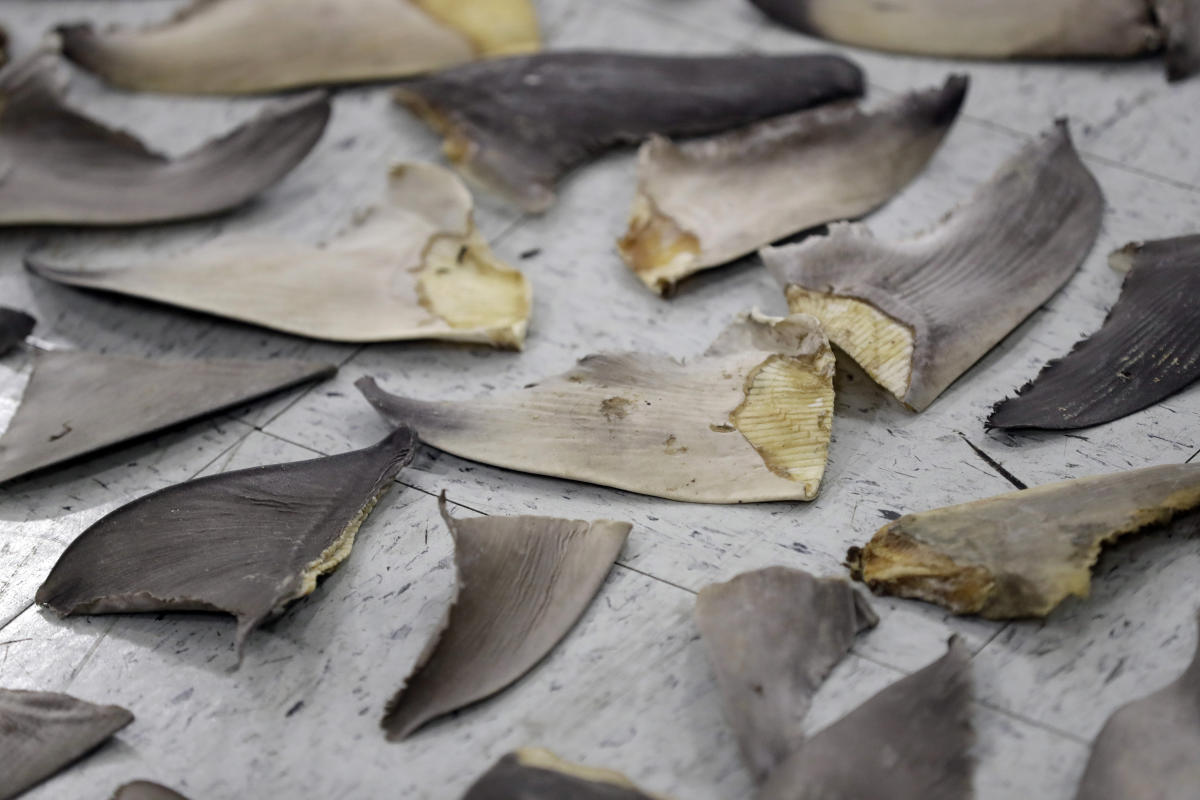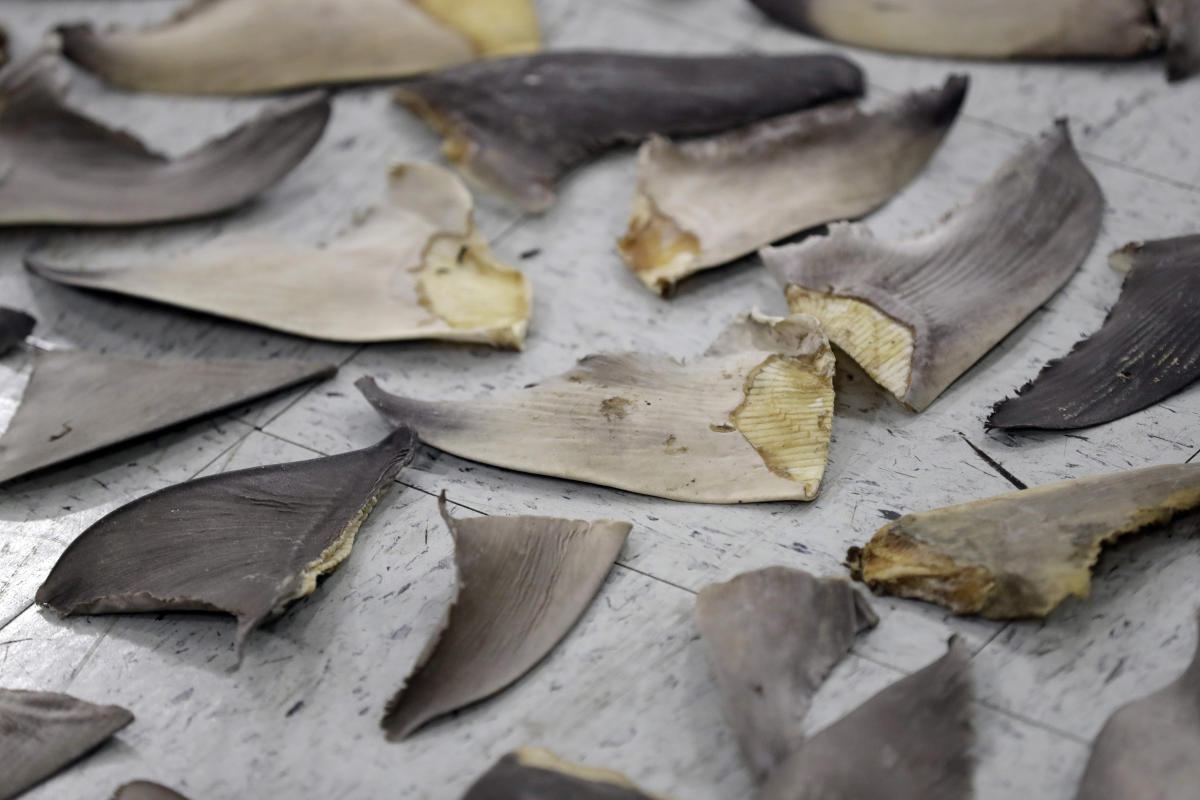
Hippos poached for their skin and teeth, sharks targeted by the fin trade and a tiny frog with translucent skin are among the hundreds of species that could get greater protection at a United Nations wildlife conference opening Monday.
The 184-nation Convention on International Trade in Endangered Species of Wild Fauna and Flora or (CITES), meeting over the next two weeks in Panama, will consider tightening trade regulations on around 600 plants and animals potentially at risk of extinction. Nine other species are recommended for less restrictive international trade regulations.
“CITES goal is to ensure that these wild species can survive in the wild for future generations,” Secretary-General Ivonne Higuero told The Associated Press. “The concern is that if we don’t regulate that trade, too much will be used, too much will be traded and enter into commerce because it’s highly valuable.”
The international wildlife trade treaty, which was adopted 49 years ago in Washington, D.C., has been praised for helping stem the illegal and unsustainable trade in ivory and rhino horns as well as in whales and sea turtles.
But it has come under fire for its limitations, including its reliance on cash-strapped developing countries to combat illegal trade that’s become a lucrative $10 billion-a-year business.
Millions of species are not listed under CITES — including, according to one study, more than a third of the online reptile trade. Domestic markets are beyond the reach of the treaty, and some experts have complained CITES listings often come after a species is too far gone. The internet is fueling the illegal trade. A Wildlife Conservation Society investigation this month found that jaguar parts, trade commercially banned under CITES, were widely available online.
Still, conservationists said CITES remains the only available tool to ensure trade in plants and animals is done sustainably. Governments will list species that require permits, bringing some level of transparency to the trade. Or if trade is putting a plant or animal at risk, a listing will limit or outright ban it.
“CITES is working, but it’s only as good as its implementation by exporting countries, transit countries, importing countries,” said Susan Lieberman, the vice president of international policy at WCS.
“The treaty is excellent. It’s the only tool we have, in the midst of a biodiversity crisis,” she continued. “We don’t need to weaken it. We need to strengthen CITES and maybe even cover more species. We also need to ensure, whether through multilateral donors, foundations, whatever, that there’s more resources going to help countries who are challenged implementing CITES.”
Fans of hippos, found in more than three dozen African countries and regulars in nature documentaries, are counting on the convention to ban commercial trade.
Ten African countries have proposed banning trade in hippos, hunted for their ivory teeth, and more recently for their skin used in belts, handbags and clothing. The United States and France were the biggest importers of nearly 78,000 hippo parts between 2009 and 2018, according to the CITES trade database, with a majority coming from Tanzania. Another 79,000 pounds (36,000 kilograms) of hippo ivory went to Hong Kong and China for hunting trophies, figurines and knife handles.
The concern is that hippos, already suffering due to climate-driven droughts and development, cannot survive extensive poaching.
“It’s great when countries do things domestically, try to take matters into their own hands to protect their own populations,” said Tanya Sanerib, the international legal director at the Center for Biological Diversity, which in March joined with the Humane Society International in requesting that the U.S. Fish and Wildlife Service list the hippos under the Endangers Species Act.
“But unless we have that sort of international collaboration, which is what CITES is designed to foster, you have mixed signals being sent about what really is happening and whether a product is legal or illegal,” Sanerib said. “So getting this commercial trade ban would be significant in terms of sending that signal loud and clear that ivory is off the table.”
The proposal to ban the hippo trade is opposed by the European Union, some African countries and several conservation groups, who argue many countries have healthy hippo populations and that trade isn’t a factor in their decline.
Sharks, too, are poised for increased protection.
Global shark populations are declining, with annual deaths due to fisheries reaching about 100 million. The sharks are sought mostly for their fins, which are used in shark fin soup, a popular delicacy in China and elsewhere in Asia.
Conservation groups argue proposals at CITES to list about 90 species, including the family of requiem sharks, would significantly limit the trade. If approved, the proposals would increase the portion of shark species in the fin trade covered by CITES from around 25% to about 90%, according to the WCS.
“What is driving down shark populations is overfishing. They have been slyly labeled bycatch when in reality they are targeted,” said Philip Chou, senior director of global policy for the conservation group Oceana. “There is a huge active trade and money to be made from the trade of shark meat, and there has always been for their fins.”
Opposition is likely to come from Japan and other East Asian countries, the hub of the global fin trade. They argue the trade should be regulated by fisheries bodies.
Turtles, snakes, glass frogs and lizards — i ncreasingly targeted by the pet and collector trade — would get increased protection, as would several timber species including African Mahogany that have been decimated by illegal logging.
The United States Association of Reptile Keepers, which advocates for responsible private ownership and trade in reptiles and amphibians, said in a statement that “addressing reductions in wild populations by limiting captive breeding and legal trade is counterproductive.
There also are controversial proposals to ease the ban on the elephant ivory trade. Zimbabwe, which has threatened to leave CITES, has pushed to allow sale of its ivory stocks and elephant skin and to use the money to manage its growing elephant population. But conservation groups and the U.S., oppose easing the ivory ban enacted in 1989.
“Most countries have domestic bans on elephant ivory markets and the fact that there are existing stockpiles out there of ivory is very troubling,” said the U.S. Department of the Interior’s Matthew Strickler, who will head the American delegation at CITES. “You certainly don’t want to see that product get on the market and kind of rekindle demand for more ivory which we all know leads to more and more poaching.”
Secretary-General Higuero said there is “no appetite for opening the market for ivory sales” but that the debate at CITES could spark a larger conversation on how to help poor countries fund conservation efforts. Many of these countries, she said, are struggling to manage their elephant populations amid worsening drought and expanding ranges that are increasing elephant-human conflict.
“We all benefit from the existence of these animals,” she said. “Therefore it’s a global responsibility to ensure that these developing countries can meet their conservation costs.”
___
Associated Press writer Patrick Whittle contributed from Portland, Maine.
___
Follow Michael Casey in Twitter: @mcasey1
___
Associated Press climate and environmental coverage receives support from several private foundations. See more about AP’s climate initiative here. The AP is solely responsible for all content.




